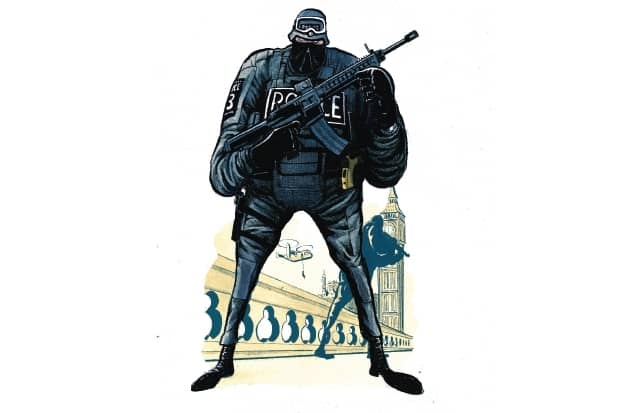Unless you’re a dog lover the news from Afghanistan has been unceasingly bleak over the course of the last month. But one story this week should give Britons particular cause for concern.
The Daily Telegraph reports that senior British intelligence officials have ‘held secret talks’ with the Taliban in Kabul. Apparently the spooks have sought assurances from the new rulers of Afghanistan that the country won’t be used to launch terrorist attacks on Britain.
Assuming that this time MI6 were talking to genuine Taliban – and not an imposter, as was the case in 2010 when they were duped by a Pakistani shopkeeper pretending to be a senior figure in the organisation – one fears that British intelligence will again under-estimate their enemy.
For in the last 30 years ineptitude and complacency has characterised much of British intelligence’s battle against Islamic extremists. It began in the 1990s, the decade in which the French intelligence services rechristened the British capital ‘Londonistan’. They were infuriated at the ‘permissiveness’ of Britain in providing sanctuary to a large number of Islamists, one of whom was the ringleader of the deadly 1995 bombings of the Paris metro, who for a decade was given refuge in Britain.
Another was Abu Hamza, who flaunted his Islamist credentials each Friday at the Finsbury Park Mosque as the security services looked on impassively. Abu Hamza’s activities were discontinued only when the USA demanded his extradition and in 2015 they jailed him for life without the possibility of parole for terrorism offences. It was subsequently alleged by an ex-informant that MI5 had ignored his warnings that Abu Hamza was running the mosque like an ‘Al Qaeda guesthouse.’
The former French security advisor turned commentator, Alexandre Del Valle never forgot a conversation with an MI5 agent in 1997, in which the latter boasted that hosting Islamists ‘allows us to know who is who and guards us against terrorism.’ As Del Valle reflected in an article in 2019, he would like to think that the MI5 agent re-examined this attitude after the London bombings of 2005.
The inquest into that atrocity heard that two of the four bombers had come to the attention of MI5 the previous year but for reasons they refused to disclose at the inquest they decided not to investigate a crucial piece of intelligence.
What MI5 did pursue in the years that followed, like so many once respected British institutions, was the approval of those wedded to identity politics. In 2016 MI5 was awarded first place in the annual Stonewall Workplace Equality Index, an achievement that delighted the then director, Andrew Parker. ‘MI5’s success in protecting the country depends on our staff’s commitment to the mission and to our enduring values of teamwork, professionalism and innovation,’ he proclaimed. ‘People can only give the best they can give when they feel supported, valued, and treated with respect.’
Regrettably, Parker’s boast about his organisation’s success was premature for in subsequent years there were a string of terrorist atrocities that uncovered a disturbing level of complacency within MI5.
The inquest into the Manchester Arena suicide bomb of 2017 heard that they missed ‘highly relevant’ information about the perpetrator prior to the attack. An inquest into the London Bridge attack in the same year heard that MI5 had ‘failed to discharge their duty’ to investigate Khuram Butt, the ringleader of the gang.
There was another Islamist outrage on London Bridge, this time in 2019, when Usman Khan fatally stabbed two people. That inquest concluded in May this year that the police and MI5 were guilty of ‘serious deficiencies’ in their management of Khan, a convicted terrorist who was supposedly under priority investigation after his release on licence in December 2018.
The father of one of the victims accused the intelligence services of being ‘complacent and passive in the face of Khan’s extreme and continuing threat.’
Three days after that inquest MI5 marked Pride month by hosting the Progress Pride flag above its HQ. ‘All of us in MI5 will be joining LGBTQ+ colleagues and allies in celebrating,’ said the new Director General Ken McCallum, who promised to make the organisation ‘a fully inclusive place to work for LGBTQ+ colleagues.’
In the aftermath of Usman Khan’s rampage, Alexandre Del Valle wrote a column in a French magazine in which he excoriated ‘the tradition of British laxity towards Islamist totalitarianism’. It was a damning critique of three decades of errors by both government and intelligence agencies, some of which he admitted had also been committed by their French counterparts. They, however, had learned lessons but the revelations about Khan demonstrated that Britain hadn’t.
One can only hope that the intelligence officials who met the Taliban aren’t as inept as many of their predecessors, and the same goes for those spooks who – one trusts – will vet the thousands of Afghans who have arrived in Britain.
Thirty years ago a Libyan family came to Britain and claimed asylum. They settled first in London before relocating to the north-west of England where they felt at home among the growing Libyan community, some of whom belonged to the Libyan Islamic Fighting Group. The father’s name was Ramadan Abedi and his son, born in 1994, would grow up to be the Manchester suicide bomber.







Comments